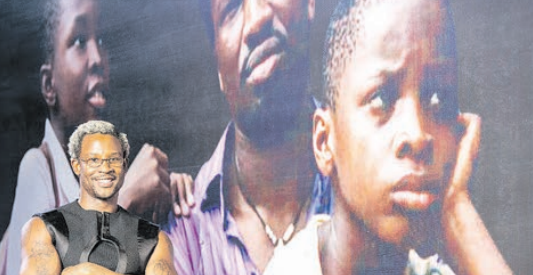History was made in Lagos penultimate Tuesday evening as British-Nigerian filmmaker, Akinola Davies Jr.’s debut feature, My Father’s Shadow, was screened to a packed hall at Filmhouse Cinema, Twin Waters Entertainment Centre, Oniru, Lagos. The screening, which drew applause from journalists, film critics, and industry stakeholders, marked the homecoming of a film that has already left its imprint on the global stage.
Earlier this year, My Father’s Shadow made its debut at the prestigious Cannes Film Festival, where it became the first Nigerian feature selected in the festival’s Official Selection (Un Certain Regard). The film went on to earn a Caméra d’Or Special Mention, a rare honour that instantly positioned it as a watershed moment for Nollywood and African cinema.
The 94-minute drama, co-written by Akinola and his brother Wale Davies, is an intimate yet ambitious story that follows two young boys, Remi and Akin (played by newcomers Godwin Chimerie Egbo and Chibuike Marvelous Egbo), who are reunited with their estranged father, Folarin Sope Dìrísù. Set in 1993 against the backdrop of Nigeria’s annulled presidential election, the story weaves the deeply personal with the profoundly political, showing how private lives are shaped by national upheaval.
It is a moving account of how in one day, two young boys glimpse the real life and real history of their father who has been mostly absent for much of their lives.
For the boys, what begins as a bewildering journey from their rural village to Lagos becomes a fleeting chance to understand the man behind their father’s absence. Along the way, they encounter his struggles—unpaid wages, unexplained illnesses, and old acquaintances who call him “Kapo.” For Folarin, it is both a desperate mission and an opportunity to leave fragments of memory and identity with the sons he barely knows.
Davies, who won the Sundance Grand Jury Prize in 2021 with his short film Lizard, described the film as a form of therapy, rooted in his own reflections on fatherhood and loss.
Speaking after the Lagos screening, he said:
“The ambiguity around the father’s fate was deliberate. Even for me, the ending is difficult to watch, because it reminds me of losing my own father. But beyond the personal, it also reflects how governments, like fathers, fail in their duty to provide, and how dysfunction sets in when that responsibility is abandoned.”
He linked this theme to the dashed hopes of the annulled 1993 election:
“I was 11 in 1993. I’m about to be 43 now. For many, the promises of change from that annulled election remain unfulfilled. Some have even died waiting for it.”
The production itself is a testament to Nigerian talent on the world stage. Shot on 16mm gauge, the film blends nostalgia with raw visual power, creating what critics have called a “visual archive of Nigeria’s history.”
It was produced by Fatherland Productions, alongside Element Pictures, MUBI, and Crybaby, with support from BBC Film and the BFI.
Fatherland Productions, co-founded by Funmbi Ogunbanwo, the first Nigerian woman to produce a film officially selected at Cannes has been instrumental in discovering and nurturing talent. The casting of the Egbo brothers through a street initiative gave the film its emotional core, their natural bond translating into moments of tenderness and truth on screen.
Industry leaders hailed the film’s impact.
For Ogunbanwo she is excited for audiences to see Lagos portrayed in this way. “Audiences will enjoy the rich tapestry of Nigeria, our people and our language. They will feel the rhythm and the sound of Lagos – the size of Lagos. The journey of these boys with their father through this city ultimately culminates in this rich experience of family,” she added.
Filmhouse Group CEO Kene Okwuosa described it as “proof of Nollywood’s growing global reach,” while FilmOne Entertainment’s Ladun Awobokun called it “the next chapter of cinematic possibility in Nigeria.”
Ṣọpẹ́ Dìrísù, widely known for roles in Gangs of London and His House, anchors the drama with a performance critics have described as “raw humanity.” His portrayal of Folarin gives the story its weight, making the father’s flaws as moving as his fleeting attempts at redemption.
My Father’s Shadow is more than a film; it is a landmark. It is about memory, identity, fatherhood, and nationhood, showing how Nigeria’s stories, told without compromise, can command attention on the world stage. Its success at Cannes and beyond is not only an artistic triumph but also a signal that Nigerian cinema has entered a new era.
Following its Nigerian premiere, My Father’s Shadow was released nationwide on September 19, marking the beginning of its global theatrical journey. With its critical acclaim, powerful storytelling, and historical significance, the film is set to excite audiences, empower local creatives, and spur additional investment in the country’s film industry. My Father’s Shadow Nigerian premiere was proudly supported by The Glenlivet Single Malt Whisky and Guiness Foreign Extra Stout.

